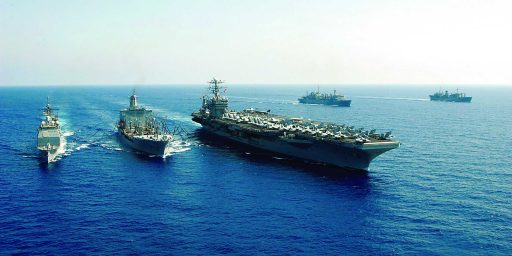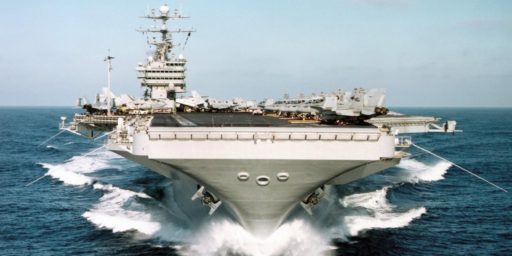Admiral Arthur Cebrowski Dies from Cancer
Admiral Arthur K. Cebrowski, who pioneered the net-centric warfare concept and led the Pentagon’s Office of Force Transformation, has died from cancer at the age of 63.
Adm. Arthur Cebrowski Dies; Led Pentagon Think Tank (WaPo, B6)
Arthur K. Cebrowski, 63, a retired Navy vice admiral who became the first leader of a Pentagon office working to transform military thinking about future readiness and combat needs, died Nov. 12 at the National Naval Medical Center in Bethesda. He had cancer.
Adm. Cebrowski began his military career in 1964 and, as a naval aviator, flew 154 combat missions during three years in Vietnam. He held a variety of command posts, and his career came to encompass extensive work in strategy. As president of the Naval War College in Newport, R.I., from 1998 to 2001, he argued against the expensive, heavily manned ships of the Cold War in favor of agile, smaller vessels that could far better “baby-sit the petri dish of festering problems we have around the world.” At the war college, his final active-duty assignment, he helped promote the concept of the Streetfighter ship that came with an ejectable escape pod for its crew. This notion was part of his focus on building a newer generation of vessels, such as the “littoral combat ship,” which could patrol coastal waters but adapt to other circumstances.
His work attracted the attention of Defense Secretary Donald H. Rumsfeld, who selected Adm. Cebrowski after his Navy retirement to direct the new Office of Force Transformation. Rumsfeld started the office as a form of think tank, designed to help the military accent speed and information-age technologies as it confronted terrorists and unstable countries more frequently. One project involved the use of small satellites to aid troops on front lines and others in the field of combat who needed photos immediately. This was an example of what he called “network-centric warfare,” a concept focused on uniting ships, aircraft, satellites and ground forces in effective and speedy ways.
Andrew Krepinevich Jr., a retired Army lieutenant colonel who is now executive director of the Center for Strategic and Budgetary Assessments, a defense research organization in Washington, said Adm. Cebrowski’s goal at the Pentagon was changing civilian and military attitudes about an entire approach toward combat. Krepinevich said Adm. Cebrowski had some successes during his short time as director, among them getting the Navy to start funding his littoral combat ships program. Also, he said, the idea of network-centric warfare “has been widely accepted, at least verbally.”
I became aware of Cebrowski a few years ago when he wrote an article about net-centric warfare in the journal Proceedings. I had the pleasure of meeting and chatting with him briefly at a conference in D.C. two years ago. He was a brilliant man who served his country admirably for decades. He will be missed.
See also:
-
Network-Centric Warfare: Its Origin and Future, Proceedings, January 1998.




I also met him once at the Naval base in Yokosuka, Japan, while he was CO of USS Midway. He indeed was a brilliant man.
Dear Kathy and Family,
My family and I wish to express our deepest sympathy to you. Please know that Art and all of you shall be remembered in our prayers now and in the difficult times ahead.
Art was a wonderful husband, father, friend and exceptional Naval officer. Hank was honored to have served with him in VF-41.
Sincerely,
Carol Anne Kleemann